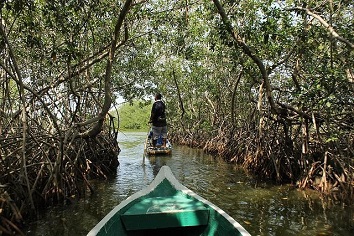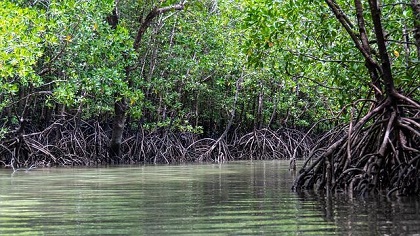News
Stories making wavesOpen to the Flow
RESEARCHERS FIND 'FRESHWATER' MANGROVES FOR THE FIRST TIME


Explorers on an expedition in Brazil's Amazon River Delta, have found mangroves growing in freshwater with a unique structure in comparison to other mangroves that have been studied worldwide. More effective carbon sinks than any other type of tropical forest, absorbing up to four times more CO2 by area than upland terrestrial forest, mangroves are primarily found in saltwater in the changing intertidal zones along marine coasts, but researchers also predict that these biologically complex forests may also be one of the largest global carbon stores.
"It was phenomenal to see this type of freshwater flooded forests in this environment," said Angelo Bernardino, a marine ecologist who found these unique freshwater mangroves, along with colleague Thiago Silver during their study of 11 mangroves in the area as part of the National Geographic and Rolex Perpetual Planet Amazon exhibition, a two-year exploration of the Amazon River Basin from the Andes to the Atlantic. "This discovery is critical to further understanding the intricacies of mangrove forests and how they are crucial to local communities that surround them."
It is thought that the freshwater mangroves, whose identification adds another180sq kms to those mangroves already known in the area, have adapted to the freshwater river flow. As well as storing carbon, safeguarding the coasts from erosion and providing a 'nursery' and essential habitat for a variety of different fish, plants and animals they will also be host to a unique ecosystem, which will need studying further. According to the report, published on 20th July 2022 in the journal 'Current Biology' "Considering that those mangroves have a unique mixture of well-developed trees, occur where freshwater is not limiting, and receive vast quantities of suspended sediments from the Amazon River plume, we predict that these forests may hold among the largest global carbon stocks of coastal oceans."
"The expedition into the Brazilian mangrove forest and subsequent discovery of freshwater mangroves is critical to painting the full picture of the vast Amazon River Basin," said Nicole Alexiev, Vice President of Science and Innovation at the National Geographic Society. She also said she hopes these expeditions will gather new information about these critical ecosystems "... and how we can support solutions to ensure their protection."